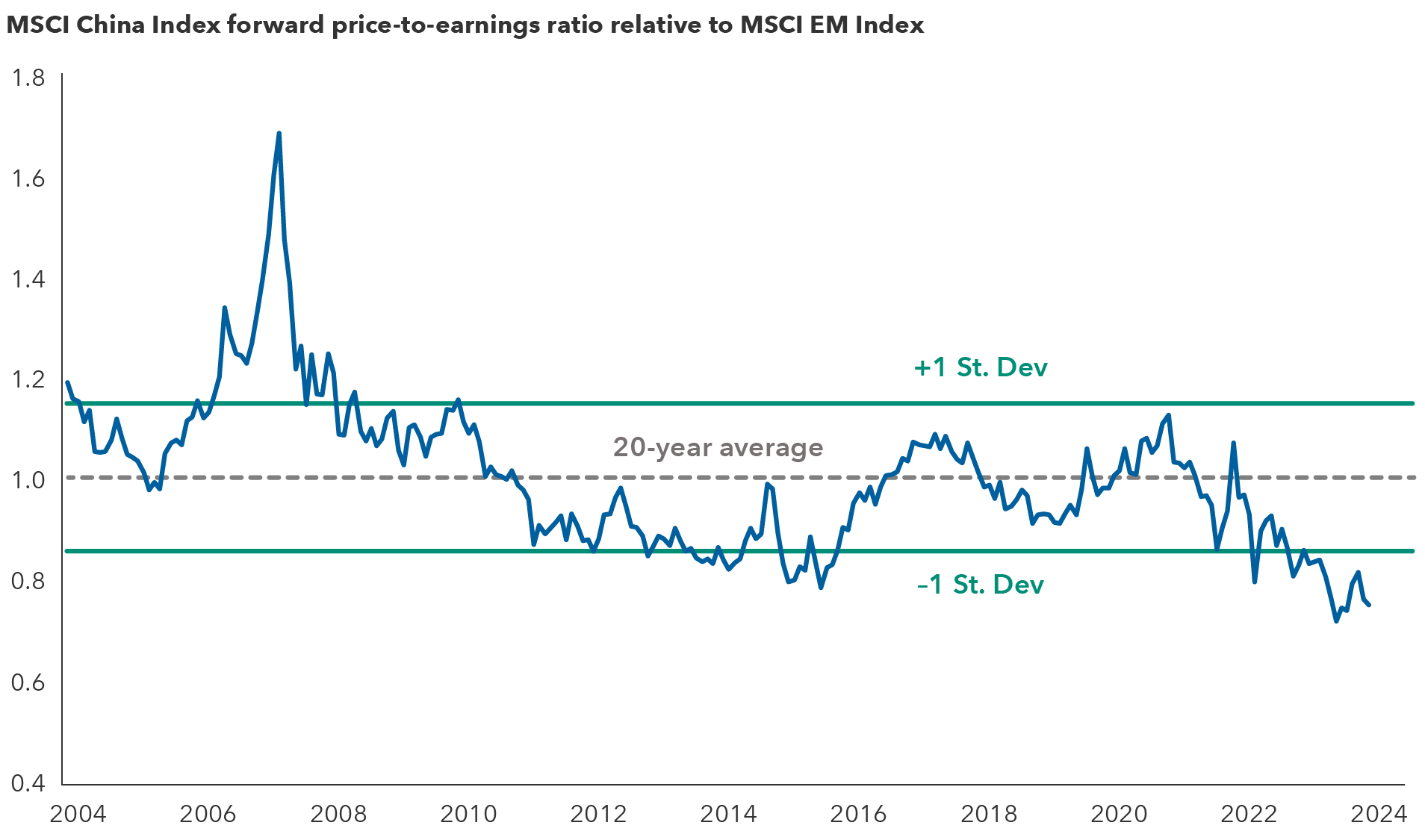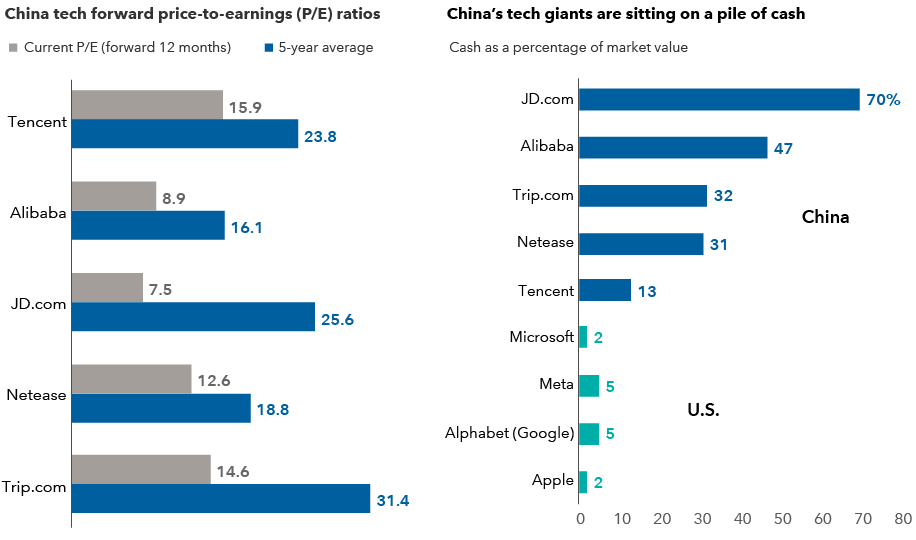Market Volatility
China
We recently toured five cities in China, visiting two dozen companies in Shanghai, Beijing, Suzhou and Shenzhen, home to the country’s leading technology firms. As we traveled the country, taking in an endless landscape of buildings, factories and office parks, we were struck by how things have improved over the past five years despite long-lasting COVID lockdowns, economic challenges and geopolitical uncertainty.
We had blue skies every day. Maybe it’s all the electric vehicles (EVs) dominating the streets, the slowdown in the economy or fewer active construction sites, but the reduction in pollution was a noticeable change. And as usual, the modern infrastructure was incredible.
Since the regulatory intervention on the private sector four years ago, many foreign investors have redirected capital from China and shifted investments into other emerging markets, like India, or more developed countries such as Japan, which is undergoing a revival. Whatever one may think of the government’s policies, China’s economy is here to stay. It’s still the world’s second largest, with a vast domestic consumer base and investment opportunities to selectively invest in the more than 650 companies in the MSCI China Index.

Source: Capital Group
Here are some observations from our travels.
1. Potential for an improvement in valuations
Many companies are now trading at very attractive valuations after a multiyear selloff. In our view, the government is slowly pivoting to supporting the economy. If they can set a floor on declining home prices, it would go a long way to unlocking household savings, reviving economic growth and improving investor and domestic sentiment.
Policymakers took a more concerted step in that direction in May, when they reduced required down payments, lowered mortgage rates and unveiled a plan for local governments to buy unsold properties and convert them into affordable housing. The People’s Bank of China and state-owned banks also cut key lending rates in late July.
In our view, this signaled party leadership may be slowly pivoting to support the economy. This inflection point could help improve sentiment and perhaps valuations to a level more consistent with gross domestic product (GDP) growth in the range of 3% to 5% over the next few years. There are no quick fixes. But if top policymakers can make progress in solving property sector challenges, consumer sentiment and the economy could improve, setting the stage for equity gains.
China trades at 20-year low to EM benchmark on relative valuation basis

Sources: Capital Group, FactSet, MSCI. Data as of July 31, 2024. St. Dev.= standard deviation. The vertical axis represents the ratio between the price-to-earnings of the MSCI China Index and the price-to-earnings of the MSCI Emerging Markets Index. Forward price-to-earnings ratio reflects the current share price relative to the consensus estimate for earnings per share on a 12-month forward basis.
2. Companies are more focused on capital returns
There are signs of fundamental change that may boost valuations. In our meetings, there was a palpable sense that companies are less focused on growth at any cost and more focused on greater discipline in capital allocation. Regulators also appear to be taking a page out of Japan’s playbook — encouraging companies to pay more in dividends and pursue stock buybacks to improve shareholder returns.
China’s internet platform companies, for example, are also rationalizing their businesses. They have been cutting costs, exiting unprofitable business ventures, selling equity stakes in other internet companies and planning to return more money to shareholders.
Along those lines, Meituan, a leader in mobile food delivery services, launched a buyback valued up to US$2 billion. Social media giant Tencent this year plans to double the size of its buyback program to around US$13 billion and increase its dividend by 42%. Meanwhile, video game maker NetEase has returned US$2.3 billion a year on average to shareholders in dividends and stock buybacks since 2021, representing close to 60% of its free cash flow.
Overall, if Chinese companies maintain positive free cash flow and follow through on dividends and buybacks, it could lead to a more balanced profile of stock returns in the years ahead.
Are China tech stocks ready for a move?

Source: FactSet. Forward price-to-earnings ratio reflects the current share price relative to the consensus estimate for earnings per share on a forward 12-month basis. Companies listed were among the 15 largest by weight in the MSCI China Index and are China's largest in areas of social media, e-commerce, online video game publishing, and online travel services as of June 30, 2024. Data for cash and short-term investments is as of March 28, 2024. Market value as of June 28, 2024. U.S. companies listed are among four largest by weight in the MSCI USA Index as of June 30, 2024, and are global leaders in areas of software, online search, social media and smart phones.
3. China is leading the global charge in electric vehicles
It’s pedal to the metal for China’s EV industry. Compared to a trip a few years ago, the lineup and pipeline of EVs was the most impressive change we saw. The cars are of striking quality at great prices. It was the biggest surprise during our travels.
Take Xiaomi, the world’s third-largest smartphone maker. In three years, the company built an EV from scratch (where Apple failed) and built a highly automated EV manufacturing plant that can produce 120,000 cars a year. Xiaomi’s first model, launched in April, has been considered a huge success and follow-up models are coming.
Telecom giant Huawei has also entered the fray, selling its software that helps power EV operating and power management systems. It has also partnered with manufacturer Seres to sell a vehicle of its own.
Despite the amazing strides in innovation, we are sitting tight. We would rather be customers than shareholders in China’s auto industry at this stage of the race. The entry of Huawei and Xiaomi further complicates industry oversupply. Plus, the brutal price war between China’s automakers could last for several years. We anticipate a shrinking profit pool will trigger a wave of consolidation, at which point we would become more interested in being investors. In the meantime, we will explore opportunities to invest in EV suppliers.
4. Consumers are down but not out
Consumers have become more price conscious and cautious. Discount e-commerce platforms are thriving, as well as some domestic consumer brands and travel-related businesses. Consumption is improving in certain areas. For example, domestic travel has rebounded this year, surpassing 2019 pre-pandemic levels. In Macau, a popular entertainment destination, there are indications of a continued recovery, with overall visits tracking higher than last year. The pace of recovery is difficult to model with precision, but from the activity we saw on the ground, things are headed in the right direction.
The casinos didn’t waste time during COVID. The older properties were refreshed, the new properties are stunning and the malls are beautiful. And the casinos have worked hard to add family-fun attractions to diversify away from gaming.
Luxury goods spending has softened. There was less foot traffic in stores and malls. Some spending among high-net-worth individuals, especially the under-30 crowd, has shifted to Japan, where they are traveling to take advantage of a weak yen. Interestingly, we were told consumption in smaller cities has held up, particularly the households who were less affected by the property crisis. Despite recent challenges, we expect China to retain its importance as a top market for the likes of French companies LVMH and Hermès.
Bottom line
We invest in stocks on a company-by-company basis. Beyond fundamental analysis, we adjust the risk premium and valuation multiples we apply to those companies based on regulation, geopolitics and industry dynamics. Even accounting for the higher risk premium given these factors, we see value emerging in select industries and companies such as internet services, domestic leisure and travel, the EV supply chain and industrial automation.
Notwithstanding recent efforts at diversification, China is and will remain central to the global supply chain in many industries for the foreseeable future. As such, it’s imperative to monitor developments in China and see the companies, management teams and facilities firsthand. We believe investors have to adapt to the new reality, which is lower GDP growth (3%–5%) for China and fixing the country’s property market model. Despite these headwinds, we believe there are — and will continue to be — investment opportunities.
Standard Deviation is a common measure of volatility that gauges how returns have varied from a mean over time. A lower number indicates lower volatility.
MSCI China Index captures large- and mid-cap representation across China A shares, H shares, B shares, Red chips, P chips and foreign listings (e.g. ADRs).
MSCI Emerging Markets Index is a free-float-adjusted market-capitalization-weighted index designed to measure equity market results in the global emerging markets, consisting of more than 20 emerging market country indexes.
MSCI USA Index is a free-float-adjusted, market-capitalization-weighted index that is designed to measure the U.S. portion of the world market.
Our latest insights
-
-
Market Volatility
-
Markets & Economy
-
-
Market Volatility
RELATED INSIGHTS
-
Global Equities
-
-
Chart in Focus
Commissions, trailing commissions, management fees and expenses all may be associated with investments in investment funds. Please read the prospectus before investing. Investment funds are not guaranteed or covered by the Canada Deposit Insurance Corporation or by any other government deposit insurer. For investment funds other than money market funds, their values change frequently. For money market funds, there can be no assurances that the fund will be able to maintain its net asset value per security at a constant amount or that the full amount of your investment in the fund will be returned to you. Past performance may not be repeated.
Unless otherwise indicated, the investment professionals featured do not manage Capital Group‘s Canadian investment funds.
References to particular companies or securities, if any, are included for informational or illustrative purposes only and should not be considered as an endorsement by Capital Group. Views expressed regarding a particular company, security, industry or market sector should not be considered an indication of trading intent of any investment funds or current holdings of any investment funds. These views should not be considered as investment advice nor should they be considered a recommendation to buy or sell.
Statements attributed to an individual represent the opinions of that individual as of the date published and do not necessarily reflect the opinions of Capital Group or its affiliates. This information is intended to highlight issues and not be comprehensive or to provide advice. For informational purposes only; not intended to provide tax, legal or financial advice. Capital Group funds are available in Canada through registered dealers. For more information, please consult your financial and tax advisors for your individual situation.
Forward-looking statements are not guarantees of future performance, and actual events and results could differ materially from those expressed or implied in any forward-looking statements made herein. We encourage you to consider these and other factors carefully before making any investment decisions and we urge you to avoid placing undue reliance on forward-looking statements.
The S&P 500 Composite Index (“Index”) is a product of S&P Dow Jones Indices LLC and/or its affiliates and has been licensed for use by Capital Group. Copyright © 2025 S&P Dow Jones Indices LLC, a division of S&P Global, and/or its affiliates. All rights reserved. Redistribution or reproduction in whole or in part are prohibited without written permission of S&P Dow Jones Indices LLC.
FTSE source: London Stock Exchange Group plc and its group undertakings (collectively, the "LSE Group"). © LSE Group 2025. FTSE Russell is a trading name of certain of the LSE Group companies. "FTSE®" is a trade mark of the relevant LSE Group companies and is used by any other LSE Group company under licence. All rights in the FTSE Russell indices or data vest in the relevant LSE Group company which owns the index or the data. Neither LSE Group nor its licensors accept any liability for any errors or omissions in the indices or data and no party may rely on any indices or data contained in this communication. No further distribution of data from the LSE Group is permitted without the relevant LSE Group company's express written consent. The LSE Group does not promote, sponsor or endorse the content of this communication. The index is unmanaged and cannot be invested in directly.
BLOOMBERG® is a trademark and service mark of Bloomberg Finance L.P. and its affiliates (collectively “Bloomberg”). Bloomberg or Bloomberg’s licensors own all proprietary rights in the Bloomberg Indices. Neither Bloomberg nor Bloomberg’s licensors approves or endorses this material, or guarantees the accuracy or completeness of any information herein, or makes any warranty, express or implied, as to the results to be obtained therefrom and, to the maximum extent allowed by law, neither shall have any liability or responsibility for injury or damages arising in connection therewith.
MSCI does not approve, review or produce reports published on this site, makes no express or implied warranties or representations and is not liable whatsoever for any data represented. You may not redistribute MSCI data or use it as a basis for other indices or investment products.
Capital believes the software and information from FactSet to be reliable. However, Capital cannot be responsible for inaccuracies, incomplete information or updating of the information furnished by FactSet. The information provided in this report is meant to give you an approximate account of the fund/manager's characteristics for the specified date. This information is not indicative of future Capital investment decisions and is not used as part of our investment decision-making process.
Indices are unmanaged and cannot be invested in directly. Returns represent past performance, are not a guarantee of future performance, and are not indicative of any specific investment.
All Capital Group trademarks are owned by The Capital Group Companies, Inc. or an affiliated company in Canada, the U.S. and other countries. All other company names mentioned are the property of their respective companies.
Capital Group funds are offered in Canada by Capital International Asset Management (Canada), Inc., part of Capital Group, a global investment management firm originating in Los Angeles, California in 1931. Capital Group manages equity assets through three investment groups. These groups make investment and proxy voting decisions independently. Fixed income investment professionals provide fixed income research and investment management across the Capital organization; however, for securities with equity characteristics, they act solely on behalf of one of the three equity investment groups.
The Capital Group funds offered on this website are available only to Canadian residents.
 Christopher Thomsen
Christopher Thomsen
 Lawrence Gong
Lawrence Gong
 Kent Chan
Kent Chan